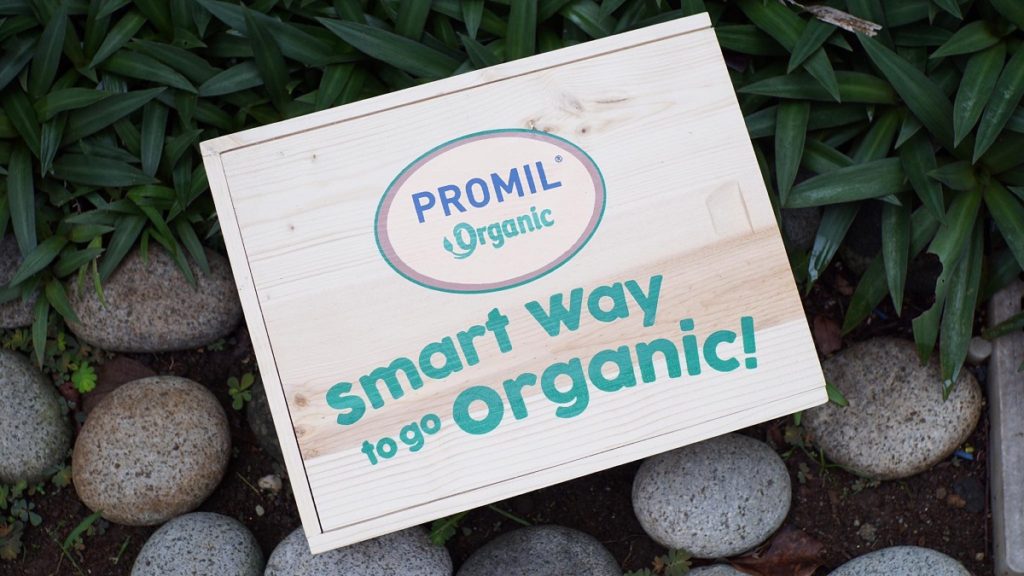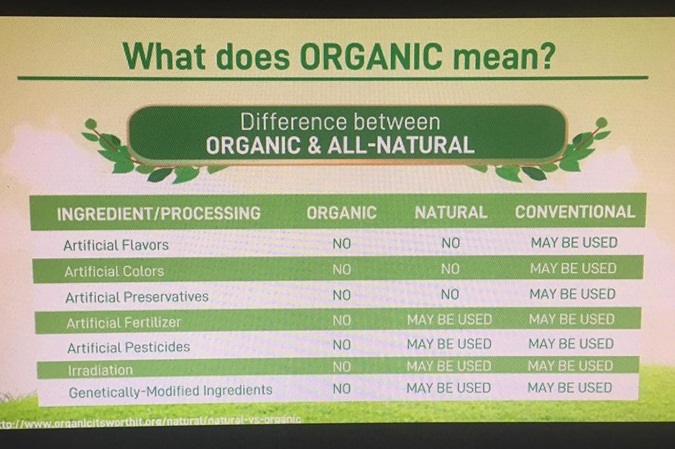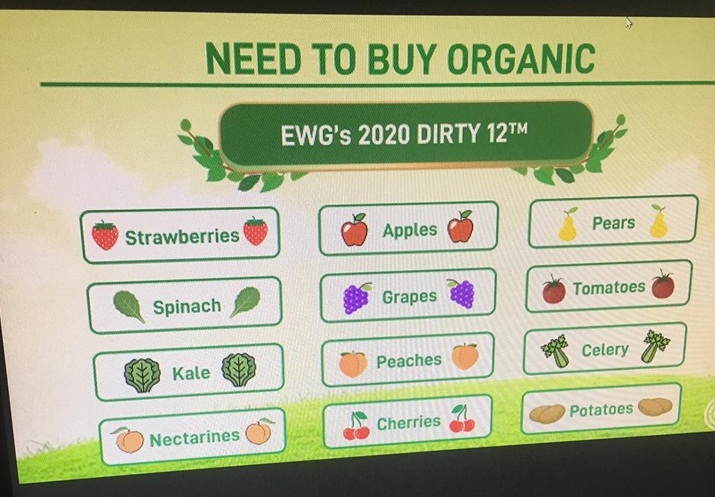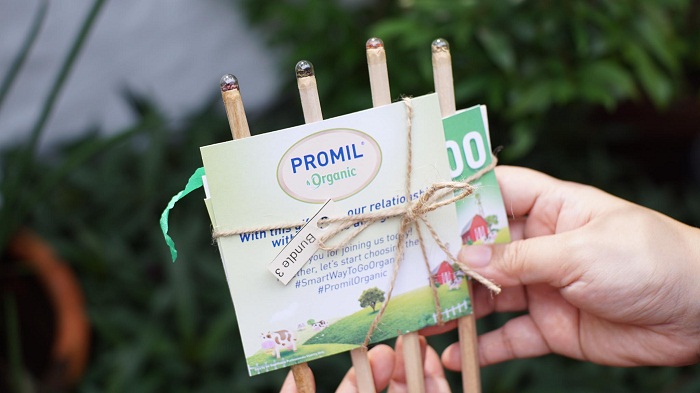Health is wealth and our food has the main influence on our health and well-being. Now, more than ever, as parents, health is in our top-most priority, and most particularly our children’s health.
Today, many parents are now embracing the concept of switching to healthier options that’s why Promil Organic’s interactive session titled “Smart Ways For Moms To Go Organic” was very timely.
In the session, a medical expert and a mom to a toddler Dr. Celeste Gomez of The Medical City Pediatrics and the Institute of Functional Medicine, who herself advocates organic nutrition for children’s growth and development, shared the benefits of organic nutrition and guided us moms about choosing organic to help strengthen family’s immunity.

Andi Manzano who hosted Promil Organic’s interactive session chooses organic milk for her daughter Olivia.

Promil Organic recently hosted an interactive session entitled “Smart Way for Moms to Go Organic” where guest moms and media were enlightened about organic food and nutrition.
Shifting to an organic lifestyle may sound intimidating for others. But essentially, vegetables or grains are organic if they have no GMO, synthetic pesticides or fertilizers, chemical additives, or sewage sludge. For meat, dairy, poultry, and fish to be labelled as organic, there should be no hormones and antibiotics, fed with organic grains or vegetables, no animal by-products, no GMO corn or soil, poultry must have access to outdoors, livestock must have access to pasture, and fish are wild caught and not farmed.

Medical expert and a mom to a toddler Dr. Celeste Gomez, from The Medical City Pediatrics and the Institute of Functional Medicine, shares the benefits of organic nutrition in the Promil Organic Interactive Session

Difference between organic and all-natural

Organic foods that we should choose against all-natural
The International Federation of Organic Agriculture Movements (IFOAM International), a Germany-based organization of organic certifying bodies, regulates the standards of Organic Agriculture which should be maintained for a certain product to be accredited as organic. In the country, the Organic Certification Center of the Philippines (OCCP), accredited by IFOAM International, gives the Certified Organic seal to products grown using agricultural standards.

Promil Organics sent Sprout pencils to guests before the interactive session. Sprouts is the first plantable and sustainable pencil in the world.
Compared to conventional food, there are a few differences between organic and all-natural. In some instances, “all-natural” products may also use artificial fertilizers or pesticides, irradiation, and GMO ingredients. On the other hand, conventional food products may use artificial flavors, colors, preservatives, fertilizer, pesticides, irradiation, and GMO ingredients.
In addition, some food products and their packaging may also contain endocrine disrupting chemicals (EDCs) which can decrease or increase normal hormone levels, mimic the body’s natural hormones, or alter the natural production of hormones when absorbed in the body. Some examples of EDCs in food are pesticides (found in vegetables, grains, and fruits), bisphenol A or BPA (food storage containers), and phthalates (food packaging).
While Dr. Gomez clarifies that conventional food is still nutritious and isn’t entirely that bad, its way of processing, as well as presence of pesticide residues and antibiotic-resistant bacteria growth, add stress on our body systems. Hence, we just need to detox more. How? By choosing whole and organic food in every chance we could.
In relation to organic food, whole foods are natural products that are not processed or refined in any way. Or if they are processed, they need to be able to retain 95% of the natural nutrients. They do not need to be bought in organic options as they are already rich in vitamins and minerals as they are. According to EWG’s 2020 Clean 15, among the examples of whole foods are avocados, sweet corn, pineapple, onions, papaya, cauliflower, and broccoli. On the other hand, some examples of plant produce that should be bought in organic are strawberries, spinach, kale nectarines, apples, tomatoes, and potatoes.
Gomez, who is a member of the Institute for Functional Medicine, further explains that Functional Nutrition is an emerging field which studies about finding the right way for each of us as individuals to use food to maximize the potential for health and wellness, specifically, by focusing on whole foods and organic choices.
“There is no single “right diet” that applies to all of us. We have different genetic backgrounds, different preferences, and different lives. We all want to be healthy, but most of us haven’t figured out just how to make food and dietary patterns serve that goal,” she added.
The world has indeed evolved now, more than ever, and we have seen so many changes in everyone’s lifestyle. Along with that change should also be the way we take care of our family’s health, particularly our little ones, through proper nutrition. A smart way to go organic is choosing an organic milk for our children. Luckily, Wyeth Nutrition’s PROMIL® Organic knows exactly what parents need.
PROMIL® Organic is made with 100% organic milk sourced from certified organic dairy farms, following all the strict standards in manufacturing an Organic formula milk, with higher levels of DHA and AA versus previous formulation to help support the development of children over 3 years old.
Organic Certified: free from antibiotics and chemical pesticides! Only the good is in PROMIL® Organic.
“PROMIL® Organic follows strict compliance of the 95% processing level and international standards from the IFOAM Organics International. It is also certified organic by the OCCP,” says Associate Marketing Director Maria Carmela Gabunada of Wyeth Nutrition.
It is the only organic formula milk expertly designed with key nutrients DHA, AA, iron, iodine and vitamin B12 to help the child with mental and visual development; boosts immunity with Vitamin A and C; Calcium, Vitamin D, K, and zinc to promote proper growth; and dietary fiber (oligofructose) to improve digestive health.
To know more about PROMIL® Organic, visit the following:
- Website:https://www.wyethparenteam.com.ph/products/promil-organic
- Facebook Page:https://www.facebook.com/PromilOrganicPH/
- YouTube Channel: https://www.youtube.com/c/PROMILORGANICPhilippines
Together, let’s choose the #SmartWayToGoOrganic with #PromilOrganic
















I am actually not really a fan of organic foods but I do think it is good that people can be given the choice – Although I am a fan of everything that is good for nature 🙂
Definitely very interesting. I’ll share this post with my friends who have kids!
Wow! This is a great information. I didnt know that there is an organic for kids. Thank you for sharing. It’s a big help.
For me it is yes feeding our kids organic may have much lower levels of metabolites of high-risk insecticides in their bodies. I believe that toxic chemicals are one of the biggest health threats to our children.
I agree with this! This is a change in lifestyle, and we need to take care of ourselves and our family. If we think it’s the best for us, then we should go for it!
I have never heard of this product before but it sounds like a great idea for new moms. I wonder if they will start selling it out here in the US.
great information though..organic food is very beneficial for everyone especially for kids..glad you shared this blog post with us…
This is really helpful! The dirty 12 is my go-to for whether or not to go organic.
There are some items that are too hard to find organic. I try my best and figure that whatever doesn’t fall under organic is still okay as long as the majority of our products are. This was a good look at the issue!
I loved reading this article and the pain you have taken to differentiate natural , conventional and organic food! I have always heard these terms but never managed to differentiate them! So thanks for a wonderful read!
These is actually an intresting topic for us mom. I believe that organic make us more healthier and so this is also healthy to our child
I agree with you. Organic foods, produced without the use of synthetic pesticides, not only help build a healthier ecosystem, they can help boost levels of phytochemicals (plant compounds with antioxidant and anti-inflammatory activities) in plant foods, as well as lower pesticide residues in the diet
I really don’t pay attention when buying food as long as I am getting the food I really enjoy eating.
But when it comes to my kids I would love to go for non GMO.though it would take ages to find the food in the supermarket
I was really suprised that there were things that was okay to buy in non organic form. Its a real eye opener.
I have been lately shifting to organic foods and my family too. I have multiple chronic health conditions. And going organic has resulted in less inflammation.